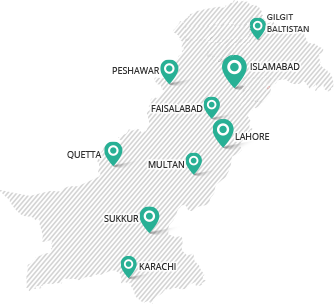The Islamic Finance Department is poised to develop the Islamic financial sectors and capital markets in line with international standards and best practices. New regulations have been introduced exclusively for the governance of the Islamic financial sector, a number of measures have been taken for the development of the Islamic non-banking financial sector, corporate sector and capital markets.
November 02, 2018 – SECP notified Shariah Governance Regulations 2018, the landmark regulations entail a comprehensive Shariah governance framework for Shariah compliant companies and Shariah compliant securities. The Regulations have set the stage for development of broad based Shariah compliant corporate sector, capital markets encouraging issuance of Shariah compliant securities.
April 09, 2018 – SECP notified for public consultation seven more Shariah Standards of Accounting and Auditing Organization for Islamic Financial Institutions (AAOIFI); Shariah Standard No. 21 – Financial Papers (Shares & Bonds), Shariah Standard No. 27- Indices, Shariah Standard No. 30 – Monetization (Tawarruq), Shariah Standard No. 44 – Obtaining and Deploying Liquidity, Shariah Standard No. 45 – Protection of Capital and Investments, Shariah Standard No. 46 – Al-Wakalah Bi Al-Istithmar (Investment Agency), and Shariah Standard No. 53- Arboun (Earnest Money).
March 01, 2018 – SECP notified Draft Shariah Governance Regulations 2018, which is a comprehensive set of regulations for governance of Shariah compliant companies and entities, Shariah compliant securities and Islamic financial institutions under its jurisdiction. The regulations issued under the enabling provisions of the Companies Act 2017, provide mechanism for the certification of Shariah-compliant companies and Shariah-compliant securities, provide Shariah screening criteria for securities, and covers functions such as internal and external Shariah audit, Shariah advisory and Shariah compliance. It is for the first time ever in the history of Pakistan that the apex regulator introduced a holistic Shariah governance framework for the companies and entities within its regulatory ambit.
February 15, 2018 – SECP has notified three Shariah Standards of AAOIFI for adoption in Pakistan, i.e. Shariah Standard No. 17 – Investment Sukuk, Shariah Standard No. 18- Possession (Qabd) and Shariah Standard No. 23 – Agency and the Act of an un-commissioned agent (Fodooli). To bring harmonization and standardization in the business practices of Islamic financial institutions SECP has been gradually adopting Accounting and Shariah Standards issued by Accounting and Auditing Organization for Islamic Financial Institutions (AAOIFI).
November 15, 2017 – SECP notified Shariah Advisors Regulations 2017, the regulations framed under the Companies Act, 2017 issued with the objective to strengthen and improve the quality and credence of Shariah advisory function, and to professionalize the Shariah advisory businesses. Companies and entities will appoint or engage only the Shariah Advisors registered with the SECP meeting the fit and proper criteria.
August 21, 2017– Sukuk (Privately Placed) Regulations 2017 issued, in order to facilitate the development and growth of the sukuk market. Extensive consultations with the stakeholders were held and the regulations were notified in line with the recommendations of stakeholders, issuers and arrangers.
May 31, 2017 – the concept of a Shariah compliant company and Shariah compliant security introduced through provisions incorporated in the Companies Act 2017, Section 451 of the Companies Act, 2017 empowered SECP to implement the scheme of certification of Shariah compliant companies and Shariah compliant securities. The regulatory provision enables the Commission to regulate almost every aspect of Shariah compliant products, services and Shariah compliant businesses.
May 31, 2017 – additional disclosure requirements for listed companies have been prescribed, in the 7th schedule of the Companies Act 2017, this will facilitate Shariah screening of companies in order to include or remove a scrip from a Shariah index (indices).
May 2, 2017 – Public Offering Regulations, 2017 issued with provisions for public offering of Shariah-compliant securities. The regulations issued in line with the recommendation of the subcommittee on Islamic capital markets in order to encourage and facilitate public issuance of Shariah-compliant securities.
September 6, 2017– Tax Credit for investment in Sukuk approved for investors other than companies in order to develop the Sukuk market and to inculcate retail investors to invest in Sukuk.
August 31, 2016 – Tax neutrality has been accorded for Sukuk Issuance vis. a vis conventional securities, through an amendment in Income Tax ordinance.
August 06, 2016 – SECP Act 1997 has been amended through SECP (Amendment) Act 2016 to empower SECP for regulating and facilitating the growth of Shariah compliant financial products in the financial services market.
Finance Act 2016-To develop Shariah compliant businesses a tax rebate of 2% allowed to Shariah Compliant listed Manufacturing companies.
January 2016 – All Shares Islamic index has been launched with around 250 Shariah compliant companies being part of index.
Modaraba (Companies and Modaraba Floatation) Ordinance 1980 been revamped, Draft Modaraba Bill 2018 has been presented to Ministry of Finance for onward approval from the Parliament.
Being member of Islamic Financial Services Board (IFSB) Malaysia, SECP has implemented the IFSB standards (IFSB-6, IFSB-9, IFSB-10, IFSB-19) through its Shariah governance framework.
Shariah-compliant mutual funds and pension funds registered phenomenal growth, the share of Shariah-compliant mutual funds represent 41% of the total mutual fund industry while assets of Shariah-compliant pension funds represent 63% of the total assets of pension funds as on January 31, 2018.
Islamic finance department held a number of training and awareness sessions, as the part of its Islamic finance capacity building and awareness creation initiative, in collaboration with IMSciences–CEIF Peshawer, and IBA- CEIF Karachi. Representatives from various government departments such as National Savings, NRSP, ZTBL and Ministry of Finance benefitted from these sessions.



